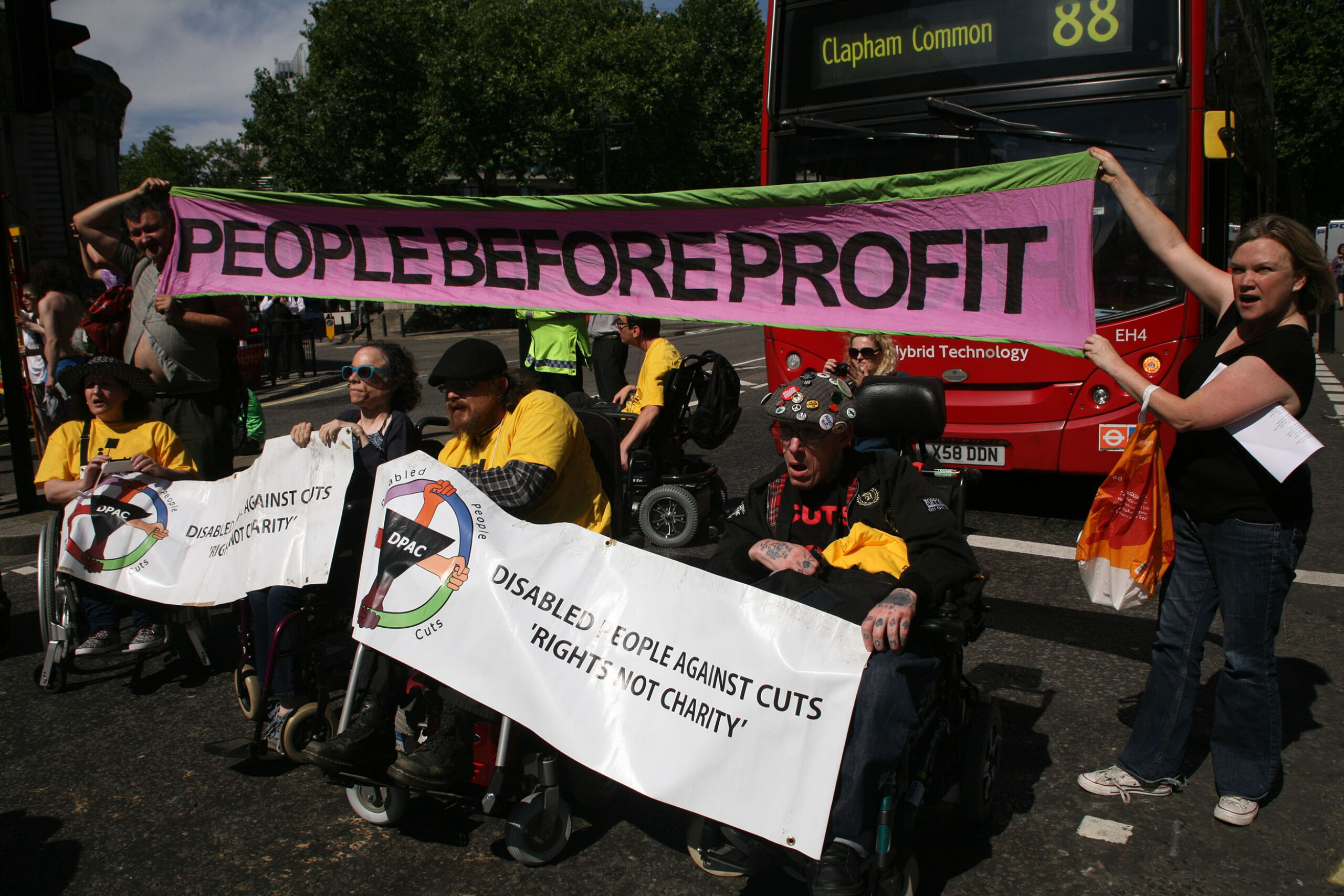
Rising energy bills are pushing the cost of living crisis into public view. As oil and gas companies stand to make billions in excess profits over the next two years, almost a quarter of the country faces fuel poverty. But this crisis is not new for some communities.
For over 10 years, Disabled People Against Cuts (DPAC) have campaigned about government failure to address the cost of living crisis. Greenpeace spoke to M-E, a Steering Group member for DPAC, about the impact of the cost of living crisis on disabled people. And why direct action is needed for a government that is failing ordinary people and refuses to listen.
Tell us about DPAC’s work on the cost of living crisis. Why do you think it’s only just getting proper attention? Do you feel the government represents bill payers across the country?
“DPAC has been taking direct action to fight and highlight this government’s cuts, austerity, welfare reforms, sanctions and privatisations. The cumulative effects of which have pushed millions of people into poverty and into a cost of living crisis for the past 12 years. And has claimed tens of thousands of lives every single year.
The government does not represent bill payers anywhere in the country. They don’t care about bill payers anywhere in the country. We talk about the cost of living crisis. What people don’t think about is that the cost of living crisis began a long, long time ago. DPAC was set up in 2010 as a result of fighting that cost of living crisis.
At the last count, 14.5 million people – children and babies included – were already suffering with the cost of living crisis. The only reason why people and the media are talking about the cost of living crisis is because it now affects ‘normal people’, i.e. not just ‘poor people’, ‘low waged workers’ and ‘disabled people’, who have been ‘othered’ and ‘dehumanised’, but also the people who are seen and counted as ‘normal’. And that really shocks, saddens and disgusts me.
But I hope that now that it is hitting the ‘ordinary person’, the lower middle class workers, that we will maybe get an end to this because now we are all rising. People are rising. It isn’t just disabled people who are rising any more to fight the cuts. Everybody is.”
The cost of living crisis is just one of the issues that can unfairly impact disabled people. How have government policies affected ordinary people and especially disabled people in society?
“They look down on them. They say they’re not working hard enough. I don’t know anyone who works harder than the poorest people in this world, whether they’re in or out of work. Yet they are looked down upon. They’re scorned and they’re pitted against each other: the hard workers, against those who don’t work hard enough or earn enough to get by and those whom they other and call shirkers and takers. Despite the fact that the majority of benefits go as pensions to pensioners and as top ups to wages for people in work, people who are paid poverty wages and need benefits and food parcels just to survive.
Benefit claimants are vilified, victimised and scapegoated for the cuts, privatisations and austerity. Then, when there are not enough hospital beds, not enough schools and not enough libraries or services, everything is blamed on those least responsible: those who are being victimised, impoverished and othered the most and thus made the most vulnerable.”
“We’re not disabled by our disabilities. We are not made vulnerable by our disabilities. We are disabled by government policy. We are made vulnerable by government policy, by their political choices.”
“We’re not disabled by our disabilities. We are not made vulnerable by our disabilities. We are disabled by government policy. We are made vulnerable by government policy, by their political choices. And it’s time that not just disabled people, but the entire population stood up and said: ‘enough is enough’, and that is what is beginning to happen.”
How are the energy and cost of living crises playing out your own life and the lives of disabled people you know?
“The cost of living crisis has been affecting me for over a decade now, as with other disabled people. And since April, when the cost of living crisis really hit and fuel prices went up, I stopped using hot water in the house. I don’t want to put my heating on because I don’t know how I’m going to afford it.”
“In April, the cost of living crisis hit with further fuel price hikes. And that was bad enough. My bills went up by £737 a year. I was already living in fuel poverty. I was already trying to keep my bills as low as they possibly could be. Then in October, it hit us again and it jumped up even further. In the meantime, I had cut back on everything. I’d stopped using hot water. I’d stopped showering with hot water at home. I’d done all I could. I still didn’t have enough. April and October’s increases have increased my fuel charges. But to compound it from April to now, [it’s gone up] nearly two grand a year. My income hasn’t increased by two grand. Nobody’s has.”
“Since April, when the cost of living crisis really hit and fuel prices went up, I stopped using hot water in the house. I don’t want to put my heating on because I don’t know how I’m going to afford it… to compound it from April to now, [my fuel charges have gone up] nearly two grand a year. My income hasn’t increased by two grand. Nobody’s has.”
“Instead wages and benefits have been frozen and have fallen in real terms. People are poorer, whilst fuel prices, housing costs and everything else is sky rocketing.”
“Millions more households are going to join those who are already impoverished and living in extreme poverty. It absolutely terrifies me. I don’t know how I’m going to survive if I don’t have the heating on. The cost of living crisis talks about the average person, i.e. the person who goes to work (and earns enough to not need benefits and foodbanks) and about their fuel bills. But what about the fuel bills of disabled people, non-workers and the elderly who have to be at home, not just in the evenings and night, but all day? Many of whom have disability related expenditures too, like charging wheelchairs. How do we heat our homes? How do we stay alive?”
What’s it like seeing people and groups unite together to demand positive change from the government?
“It’s sad that it has taken this long. That it has taken the cost of living crisis, hitting millions more ordinary people rather than just ordinary disabled people, for the country and charities and other people to go: “Hang on, this is wrong. Not in my name.” But I welcome it. I welcome that finally, the unions, charities and others are saying we need to unite and stand together.
Greenpeace, Extinction Rebellion, DPAC, everyone is starting to say that this is not just the climate crisis. It is a social crisis, it is a humanitarian crisis, it is a cost of living crisis. It’s the cost of greed crisis. And we need to stand and act together.
This government has also brought in laws to prevent us from standing together. To prevent us from protesting. To prevent us from sharing and speaking the truth. Because they know that we are rising, we are uniting – that when we stand together, they don’t stand a chance. And we are standing. We are rising. And it makes my heart sing. It gives me some hope. I just hope it’s not too late.”
“We are uniting… when we stand together, they don’t stand a chance. And we are standing. We are rising. And it makes my heart sing. It gives me some hope. I just hope it’s not too late.”
Finally, why is taking action vital right now?
“People will die if we don’t. Already austerity and cuts have claimed over 300,000 lives. Already wages, benefits, pensions and foodbanks were not providing enough to house or keep body and soul together. Impoverished, hungry, malnourished babies and children now have scurvy and rickets. People are suffering from malnutrition, not just hunger, and dying in their hundreds of thousands. The fuel price hikes and the extension of the ‘cost of living crisis’ and austerity to millions more people, will result in even greater numbers of ‘excess winter deaths’, austerity deaths, deaths on our streets and benefit deaths. One extra death is one too many.
It’s time. We have to change. We have to put life before profit. People before profit. Planet before profit. And we must stop leaving everything in the hands of the few, when we are the many. It’s our responsibility, it’s our duty, it’s our obligation, to hold them to account. And what we need to do is to live and to protect life. We want to live. We deserve to live. We must choose to live. Living and helping others to live right now is an act of rebellion. And we need to rebel.”
Find out more about Disabled People Against Cuts on their website. You can also keep up with DPAC on twitter and DPAC on facebook.
Guest authors and interviewees work with us to share their personal experiences and perspectives, but views in guest articles and interviews aren’t necessarily those of Greenpeace.
